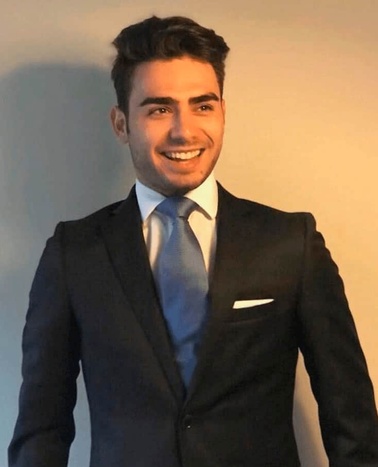
Rubén Basoco
Rubén grew up surrounded by law. After studying law in college, he decided to complete the Doble Máster de Acceso a la Abogacía y Asesoría Jurídica de Empresas degree at IE Law School. For him, a special strength of the program are the professors, who are professionals and practicing lawyers. Rubén likes to spend his free time reading good books, playing the piano, exercising, traveling and above all, getting together with family and friends. At the end of the master he wants to put the knowledge he has acquired into practice by joining a law firm, while continuing to learn.

"The master has not only taught me Spanish law, but has also helped me develop the technical skills I will need to work in different areas of law internationally."
Where are you from? Have you lived abroad?
I was born in Logroño, where I lived until I finished high school, then I went to Pamplona to study law at the University of Navarra. I currently live in Madrid where I’m studying the Doble Máster de Acceso a la Abogacía y Asesoría Jurídica de Empresas at IE Law School.
Although I haven’t lived abroad long-term, I’ve spent some time, though less time than I would have liked, in the US and Italy.
Why did you decide to study law?
My father is a lawyer and almost my entire family works in the business world. I’ve had the opportunity to grow up in an environment where law was frequently the topic of conversation. Living daily life so close to the practice of law, the constant study that it requires and more than anything, the human factor involved in practicing law are what led me to study law.
What stands out from your experience (both professionally and personally) at IE Law School? Any stories you’d like to share?
On a professional level, I would highlight the opportunity to work with a wide range of IE Law School professors, who are very good teachers, but also great professionals. I think that when choosing a law master’s program, it is essential to choose one where part of the faculty are practicing lawyers. As students we are only one step away from entering the real world and I don’t think there’s anyone better to prepare us for that reality.
On a personal level, I would highlight the other students and the way you experience the master’s program with them. This experience is much more intense than college. Students spend almost all day together and the friendships you forge are very strong. Another thing I would highlight is IE’s teaching methodology. It’s based on preparing case studies in groups, which helps students understand what practicing law is all about, what it means to work in teams. But most importantly, at least in my case, we learn that the most important lessons come from our fellow students and everything we learn when we work together.
An anecdote I’d like to share highlights the opportunities IE Law School offers you to participate in different projects. During the master I was able to participate with a group of friends from the program in the Legal Challenge organized by Baker Mckenzie, which was a very enriching experience that combined both personal and professional aspects, and was a very real look at what we will experience in daily office life.
What areas of law interest you and why?
The areas of law that most interest me are commercial and real estate, because both areas involve daily challenges based on the variety of problems involved in each and the consistent complexity of their structures.
Do you think IE gives you a more global and comparative view of law?
The master has not only taught me Spanish law, but has also helped me develop the technical skills I’ll need to work in different areas of law internationally. Many of the case studies involve learning how to reconcile different legal systems, and I think it’s essential to learn how to work with them because they are increasingly part of our legal culture.
Have you had any experience abroad? What did you learn from the experience about culture and the way people see law?
Since I was very young, I’ve had the opportunity to travel on a regular basis, and even to spend long periods of time in the US and Italy, as I already mentioned. Although it was never long-term, being in contact with other cultures provides you with a more complete picture of what the world expects of you as a person and as a professional. When you want to dedicate yourself to law, you realize that law exists in almost all aspects of our lives, which makes you relate to everything around you in a very different way. In most cases, traveling involves accelerated learning about the daily relationships other cultures and other people have with the law, which gives you a more complete picture of what awaits us beyond our borders.
What are your hobbies or interests? What do you like to do in your free time?
I love having free time to disconnect and I travel when I can, although in my everyday life I like to spend my free time reading good books, playing the piano, exercising and especially getting together with friends and family.
What are your plans upon completing the Master in Acceso a la Abogacía? What are your professional goals?
When I complete the program, I will find a job at a law firm to put all of the lessons I’ve learned this year into practice, and in order to enter the professional world for real.
It’s harder to set a concrete goal for the long term, but I think that all the students at this institution want to continue learning, gain responsibility over time and use that responsibility for the benefit of great professionals and the people who rely on us as lawyers to solve their problems.
How do you think technology has influenced the practice of law? And how do you think it will affect you (and your generation) in the near future?
Technology is advancing all the time, and I’m sure that the technology that will be available in a few years will be very different from what’s available today. That’s excellent, because it means we’re moving forward.
I think technology can only mean good things for the legal profession. Processes will be much faster and the way we work will be different. It’s our responsibility as lawyers to know how to adapt and to take advantage of those improvements in order to keep providing quality services. Unlike some other jobs, I don’t think machines will be able to replace legal professionals. These advances will mean changes in the way we work, but the truth is that our profession has a large human component. Knowing how to communicate, listen and empathize with clients are essential skills.